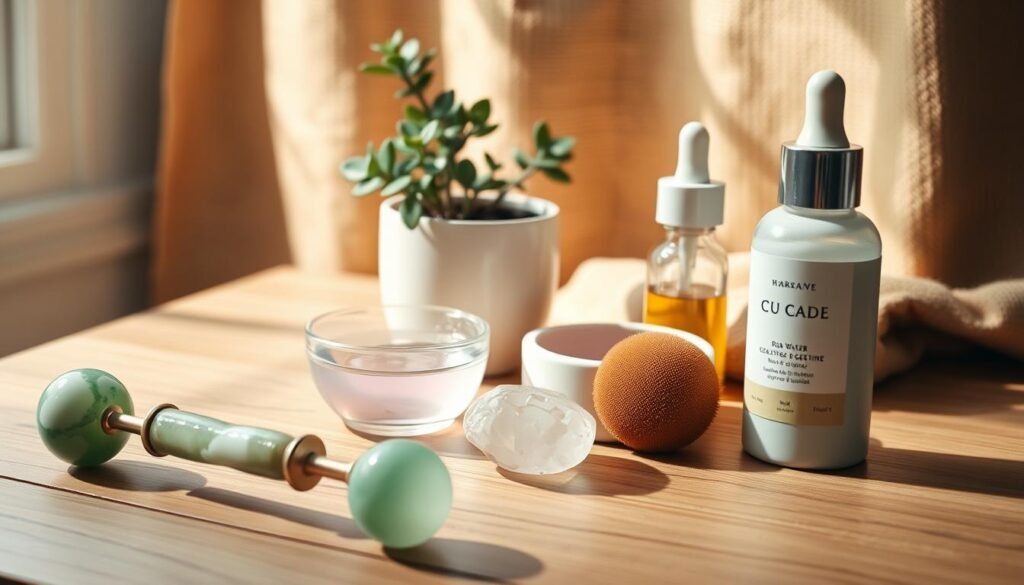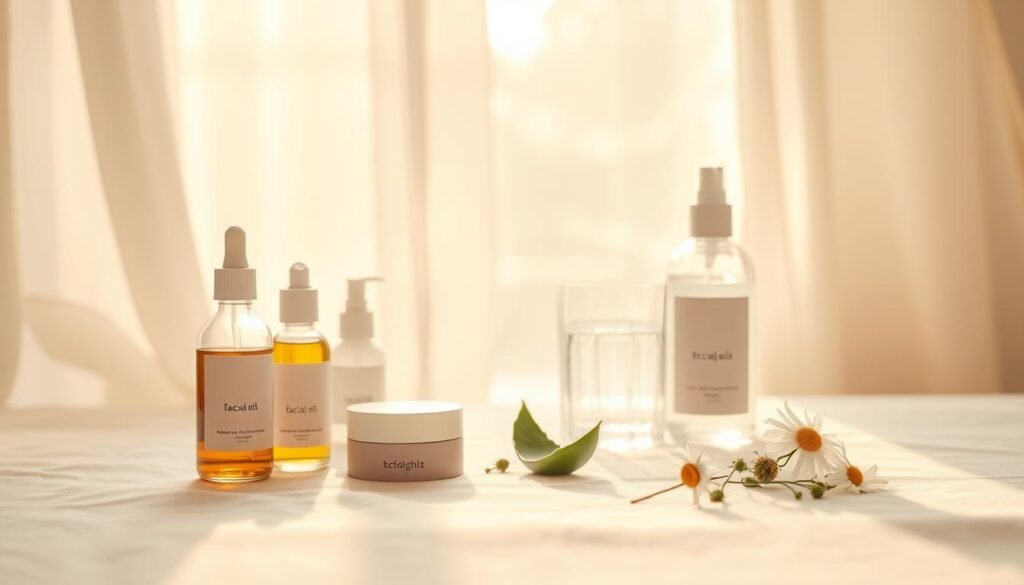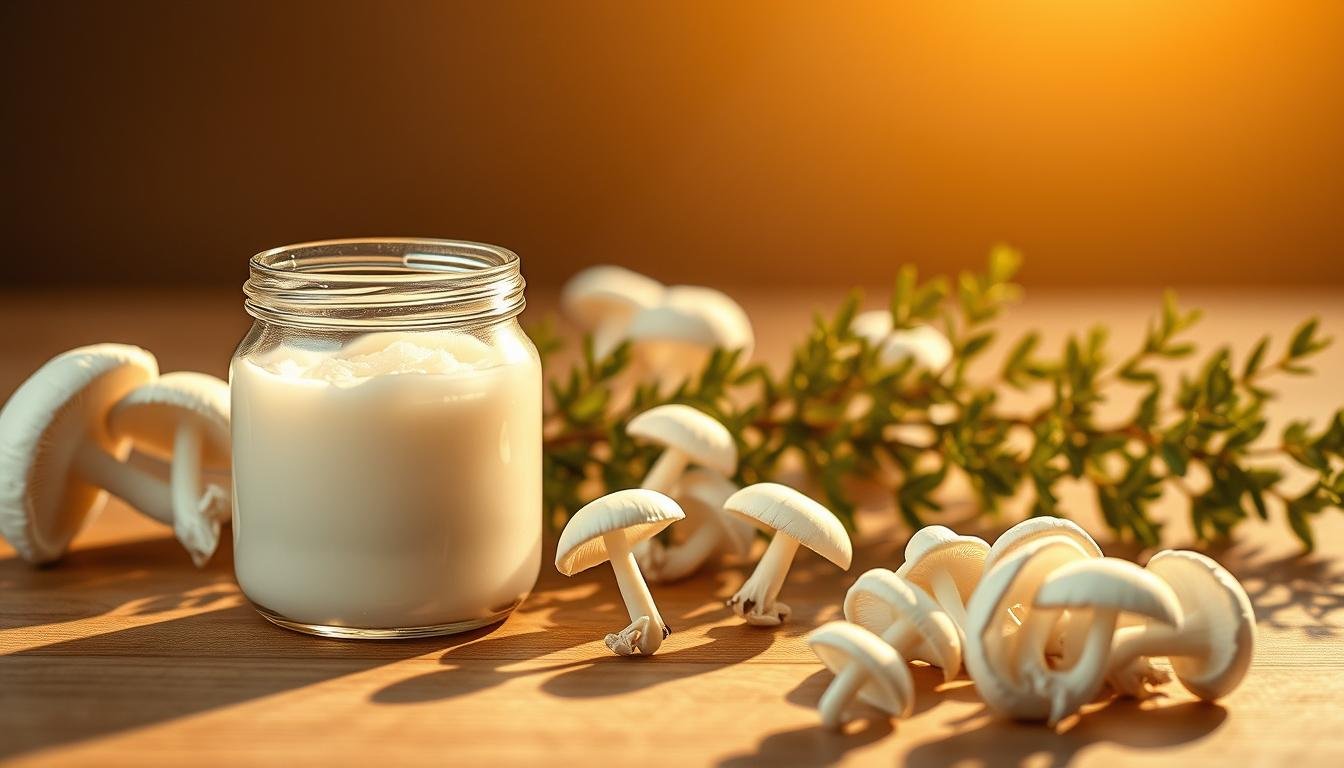Are you having trouble keeping your skin healthy and glowing all year? The weather can really affect your skin’s health. It’s key to change your skincare routine with the seasons.
When the weather changes, so does your skin’s needs. Dry winter air can take away your skin’s moisture. Meanwhile, the hot summer sun can make your skin produce more oil and cause sun damage.
Knowing how weather affects your skin helps you protect and care for it. This way, you can keep your skin healthy and glowing all year.
Key Takeaways
- Understand how different weather conditions impact your skin.
- Learn to adjust your skincare routine according to the season.
- Discover products and practices that help maintain healthy skin.
- Protect your skin from extreme weather conditions.
- Nourish your skin with appropriate care and products for each season.
Understanding How Humidity Affects Your Skin
As the seasons change, so does the humidity level, affecting our skin. Humidity, or the moisture in the air, is key to skin health. It affects how hydrated our skin is, how much oil it makes, and how it looks.
The Science Behind Humidity and Skin
The skin reacts to humidity through its natural barrier. In humid air, the skin holds more moisture, leading to more oil and clogged pores. On the other hand, dry air makes the skin dry and irritated.
The skin’s outer layer, the stratum corneum, keeps water in. High humidity makes this layer absorb more moisture, causing swelling. Low humidity, however, dehydrates it, weakening its barrier.
Types of Humidity: High vs. Low
High Humidity: Moist air is good for dry skin but bad for oily skin. It can make oily skin worse, leading to acne.
Low Humidity: Dry air takes away the skin’s moisture. This causes dry patches, irritation, and can make eczema worse.
Knowing if you’re in high or low humidity is key to adjusting your skincare. By understanding humidity’s impact, you can keep your skin healthy all year round.
Essential Skincare Tips for Humid Weather
When humid weather hits, it’s time to check your skincare routine. Humid air can make your skin oily and clog pores. It’s important to adjust your skincare to handle these issues.
Lightweight Moisturizers to Opt For
In humid weather, your skin might not need thick moisturizers. Instead, choose lightweight moisturizers that hydrate without clogging pores. Look for “non-comedogenic” or “oil-free” labels to avoid making your skin oilier.
Ingredients like hyaluronic acid and glycerin are great in lightweight moisturizers. They keep your skin moist without feeling heavy.
Importance of Non-Comedogenic Products
Using non-comedogenic products is key in humid weather to avoid clogged pores. These products won’t block pores, reducing acne and blackheads. Always choose products labeled as non-comedogenic in the summer.
“The right products can make all the difference in your skincare routine, especially in humid weather. Non-comedogenic products are a must to keep your skin clear and healthy.”
Sunscreen in Humid Conditions
Sunscreen is still essential in humid weather. UV rays can still harm your skin, causing aging and cancer. Pick a lightweight, broad-spectrum sunscreen with at least SPF 30. Many sunscreens are now non-greasy and work well under makeup.
| Product Type | Key Features | Benefits in Humid Weather |
|---|---|---|
| Lightweight Moisturizer | Non-comedogenic, oil-free | Hydrates without clogging pores |
| Non-Comedogenic Products | Pore-friendly, reduces acne risk | Prevents clogged pores and acne |
| Lightweight Sunscreen | Broad-spectrum, SPF 30+ | Protects against UV damage without feeling greasy |
By following these skincare tips, you can handle humid weather better. You’ll keep your skin healthy and glowing.
Adjusting Your Skincare Routine in Dry Weather
When the weather gets dry, it’s time to check your skincare routine. Dry air can take away your skin’s moisture. This can cause dryness, irritation, and make conditions like eczema worse.
Hydration: Why It Matters
Keeping your skin hydrated is key, especially when it’s dry. Dry air messes with your skin’s natural moisture barrier. Drinking water is important, but don’t forget about moisturizing your skin too.
Key Hydrating Ingredients:
- Hyaluronic Acid: Known for its ability to retain up to 1000 times its weight in water.
- Glycerin: Helps attract moisture to the skin.
- Ceramides: Essential for repairing the skin’s barrier function.
Best Ingredients for Dry Climates
In dry climates, the right ingredients are crucial for skin health. Look for products with ingredients that hydrate and protect your skin from the environment.
| Ingredient | Benefit |
|---|---|
| Shea Butter | Provides intense moisturization and nourishment. |
| Niacinamide | Improves skin elasticity and enhances the skin’s barrier function. |
| Vitamin E | Antioxidant properties help protect the skin from damage. |
“The key to healthy skin in dry climates is not just about moisturizing, but also about protecting the skin from the harsh conditions. A balanced skincare routine that includes both hydration and protection is essential.”
How to Layer Products in Low Humidity
Layering skincare products right is key in low humidity. Start with a gentle cleanser, then a hydrating toner. Next, use a serum with hyaluronic acid or glycerin. Finish with a moisturizer with ceramides or niacinamide. Don’t forget to apply sunscreen during the day to protect against UV rays.
Tip: In very dry conditions, using a humidifier at home can help. It adds moisture back into the air, keeping your skin hydrated.
The Role of Lifestyle Choices in Skincare
Skincare isn’t just about products; it’s also about our lifestyle. Our skin shows our overall health. Diet, hydration, and stress levels can greatly affect it.
Dietary Impact on Skin Health
Eating well can make your skin healthier. Foods like fruits, veggies, and omega-3s are good for your skin. Antioxidant-rich foods, like berries and greens, fight off skin damage.
But, eating too much processed food and sugar can cause inflammation. This can make acne worse.
Eating foods full of nutrients can help your skin. Vitamin C boosts collagen, and zinc fights inflammation.
Importance of Hydration
Drinking enough water is key for skin health. It helps remove toxins and keeps skin moist. Aim for eight glasses a day, but adjust based on your activity and where you live.
In dry weather, keeping skin hydrated is even more important. Using a humidifier can help keep the air moist, which is good for your skin.
Stress Management Techniques
Stress can harm your skin, causing problems like acne and rosacea. Activities like yoga, meditation, or deep breathing can help. Regular exercise also reduces stress and improves skin.
Getting enough sleep is also vital for skin health. Try to sleep 7-9 hours each night to help your skin heal.
Seasonal Skin Concerns
Different seasons bring different skin challenges. Summer can cause acne, while winter makes skin dry. Knowing these seasonal skin concerns is key to keeping your skin healthy and glowing all year.
Acne and Oily Skin in Humidity
High humidity makes skin produce more oil, leading to clogged pores and acne. To fight this, use lightweight, oil-free products that won’t block pores. Look for “non-comedogenic” or “oil-free” labels to avoid making acne worse.
Washing your face gently twice a day helps control oil and reduce acne. Also, adding a salicylic acid treatment can help remove dead skin and clear pores.
Dry Patches and Eczema in Cold Weather
Cold weather takes away the skin’s natural moisture, causing dry patches and worsening eczema. To keep your skin moist, moisturize regularly with hydrating products. Hyaluronic acid, ceramides, and shea butter are great for keeping moisture in.
Avoid harsh soaps and take shorter, lukewarm showers to protect your skin’s barrier. If you have eczema, using a humidifier indoors can help keep your skin moist.
Effective Cleansing Techniques by Season
Different seasons bring different skin challenges. It’s important to adjust your cleansing techniques accordingly. Knowing how to cleanse your skin effectively in various weather conditions is key to maintaining healthy, glowing skin.
Gentle Cleansing for Humid Months
In humid weather, the skin produces more oil. This makes it prone to clogged pores and acne. Using a gentle cleanser that removes dirt without stripping the skin of its natural oils is vital.
Tips for Gentle Cleansing:
- Use a mild, non-comedogenic cleanser.
- Avoid harsh scrubbers that can irritate the skin.
- Cleanse your face twice a day to keep pores clear.
Exfoliation Tips for Dry Seasons
Dry seasons require extra care to remove dead skin cells without drying out the skin further. Exfoliation is a critical step that helps maintain skin texture and promote cell renewal.
Exfoliation Techniques:
| Exfoliation Method | Frequency | Benefits |
|---|---|---|
| Chemical Exfoliants | 1-2 times a week | Gently removes dead skin cells, promotes cell turnover |
| Physical Exfoliants | 1 time a week | Removes dead skin cells, improves skin texture |
Double Cleansing: When and How
Double cleansing involves using two types of cleansers: an oil-based cleanser followed by a water-based cleanser. This method is particularly effective in removing makeup and sunscreen while keeping the skin clean.
Double Cleansing Tips:
- Start with an oil-based cleanser to dissolve makeup and sunscreen.
- Follow with a water-based cleanser to deep clean the pores.
- Use this method at night, especially when wearing heavy makeup.
The Importance of Customizing Your Routine
For the best skincare, tailor your routine to your skin type and the seasons. It’s not just about picking the right products. It’s also about knowing how your skin reacts to weather and adjusting your routine.
Identifying Your Skin Type
First, figure out your skin type. There are four main types: normal, dry, oily, and combination. Knowing your skin type helps pick the right products. For example, dry skin needs hydrating products, while oily skin does better with lightweight, oil-free ones.
To find your skin type, watch how it acts all day. If it’s oily, especially in the T-zone, you might have oily or combination skin. If it feels dry, you likely have dry skin. Talking to a dermatologist can help if you’re still unsure.
Tailoring Products to Seasonal Changes
After knowing your skin type, adjust your products with the seasons. In humid weather, use lightweight, non-comedogenic products to avoid clogged pores. In dry weather, choose richer, hydrating products to fight dryness and irritation.
In winter, use a more intense moisturizer to fight dry air. In summer, a lightweight moisturizer with SPF protects your skin from the sun while keeping it moist.
- Use products with hyaluronic acid and ceramides in dry weather to lock in moisture.
- Opt for products labeled “non-comedogenic” or “oil-free” in humid weather to avoid clogged pores.
- Exfoliate regularly but gently to remove dead skin cells and improve skin texture, regardless of the season.
By adjusting your skincare to your skin type and the season, you can get healthier, more resilient skin. The key is to watch your skin’s needs and change your products and routine as needed.
Ingredients to Incorporate by Season
To keep your skin healthy and radiant, it’s key to add season-specific ingredients to your skincare routine. Each season poses unique challenges for the skin. For example, summer brings humidity and heat, while winter is dry and cold.
Humidity-Friendly Ingredients
In humid weather, it’s important to use ingredients that control oil and prevent breakouts. They should also keep the skin moist. Salicylic acid and tea tree oil are great for fighting acne. Aloe vera helps soothe and reduce inflammation.
- Salicylic acid for exfoliation and acne control
- Tea tree oil for its antimicrobial properties
- Aloe vera for hydration and soothing
Winter Skin Savers
In winter, the skin needs ingredients that deeply hydrate and protect against harsh weather. Hyaluronic acid is a strong humectant that holds moisture. Ceramides help fix the skin’s barrier. Glycerin draws moisture to the skin, keeping it soft and hydrated.
| Ingredient | Benefit |
|---|---|
| Hyaluronic acid | Retains moisture |
| Ceramides | Repairs skin barrier |
| Glycerin | Attracts moisture |
Essential Tools for Seasonal Skincare
Keeping your skin healthy all year round means adjusting your skincare routine with the weather. Having the right tools is key. Two tools are crucial for your seasonal skincare.

The Role of Humidifiers
Humidifiers are a must-have for your skincare, especially when it’s dry outside. They keep the air’s moisture level right, preventing dryness and irritation. This keeps your skin soft and moist, especially in cold, dry places.
Benefits of Using a Humidifier:
- Maintains skin hydration
- Reduces dryness and irritation
- Creates a more comfortable environment for skin care
Face Masks for Different Weather
Face masks are vital for changing your skincare with the seasons. Different masks tackle specific skin issues based on the weather. For instance, hydrating masks are great for cold, dry weather. Clay-based masks are good for humid climates to control oil.
Recommended Face Masks for Different Seasons:
- Hydrating masks for winter
- Clay-based masks for summer
- Exfoliating masks for spring and autumn
Common Skincare Mistakes to Avoid
Knowing how to change your skincare routine with the seasons is key. Different weather brings different challenges for your skin. Simple changes can make a big difference in how your skin looks and feels.
Over-Moisturizing in Humid Weather
One big mistake is using too much moisturizer when it’s humid. Moist air makes your skin produce more oil. Heavy moisturizers can clog pores and cause acne. Choose lightweight, oil-free moisturizers for better hydration.
Neglecting Sunscreen in Cooler Months
Many forget to use sunscreen in cooler months. They think it’s only for sunny days or summer. But, UV rays can get through clouds and harm your skin, even in winter. Always use a broad-spectrum sunscreen with at least SPF 30, every day.
By avoiding these common mistakes, you can keep your skin healthy all year. The secret to great skincare is knowing what your skin needs and adjusting as the seasons change.
Men’s Skincare: Seasonal Considerations
Seasons change, and so should men’s skincare routines. Different weather brings different challenges. It’s key to adjust skincare to meet these needs.
Unique Needs for Men’s Skincare
Men’s skin is thicker and oilier than women’s. It has bigger pores and is more prone to ingrown hairs and razor burn. This means men need special care, especially in different climates.
In humid weather, men must control oil and prevent clogged pores. In dry conditions, they focus on keeping skin hydrated and protecting it from harsh winds and cold.
Seasonal Tips for Men’s Grooming
Here are some seasonal tips for men’s grooming:
- Spring: Exfoliate often to get rid of dead skin and clear pores, readying skin for warmer weather.
- Summer: Use light, non-clogging moisturizers and broad-spectrum sunscreens to guard against UV rays.
- Autumn: Start using thicker moisturizers to fight off drying winds and cooler air.
- Winter: Emphasize deep hydration and use protective products to shield skin from harsh weather.
By changing their skincare with the seasons, men can keep their skin healthy and strong all year.
Keeping Track of Your Skin’s Needs
Understanding your skin’s needs is key to a good skincare routine. As seasons change, so do your skin’s demands. It’s important to watch and adjust your care as needed.

Journaling Your Skin Changes
Keeping a skincare journal is a great way to track your skin. Note any changes, reactions to products, and environmental effects. For example, you might find your skin gets oilier in summer. This means you need to adjust your summer skincare routine to control oil and keep skin hydrated.
Just jot down your observations daily or weekly. Over time, your journal will help you understand your skin better. It will guide you in making smart skincare choices.
When to Consult a Dermatologist
While journaling and tweaking your routine can solve many issues, sometimes you need a pro. If you have ongoing problems like acne, redness, or sensitivity, see a dermatologist.
“A dermatologist can provide personalized advice and treatment plans tailored to your specific skin type and concerns, helping you achieve healthier skin.”
Also, if your skin changes suddenly or severely, get expert advice. A dermatologist can check for serious conditions that need medical care.
| Skin Concern | Possible Cause | Action |
|---|---|---|
| Acne in humid weather | Excess oil production, clogged pores | Adjust humidity skin care routine, use non-comedogenic products |
| Dry patches in cold weather | Low humidity, harsh winds | Increase moisturizer use, consider humidifier |
By being attentive and proactive, you can keep your skin healthy all year round.
Conclusion: Emphasize Adaptability in Skincare
As the weather changes, so do your skin’s needs. It’s important to adjust your skincare routine with the seasons. This helps keep your skin healthy and strong.
During winter, use hydrating products and layer them right. In humid weather, switch to lightweight, non-comedogenic products to avoid clogged pores.
Putting it into Practice
First, figure out your skin type and what you’re worried about. Then, choose products and routines that fit. Keep a journal of your skin changes and talk to a dermatologist for advice.
Take the First Step
Start making changes to your skincare routine today. Use the tips from this article to keep your skin glowing, no matter the weather.



